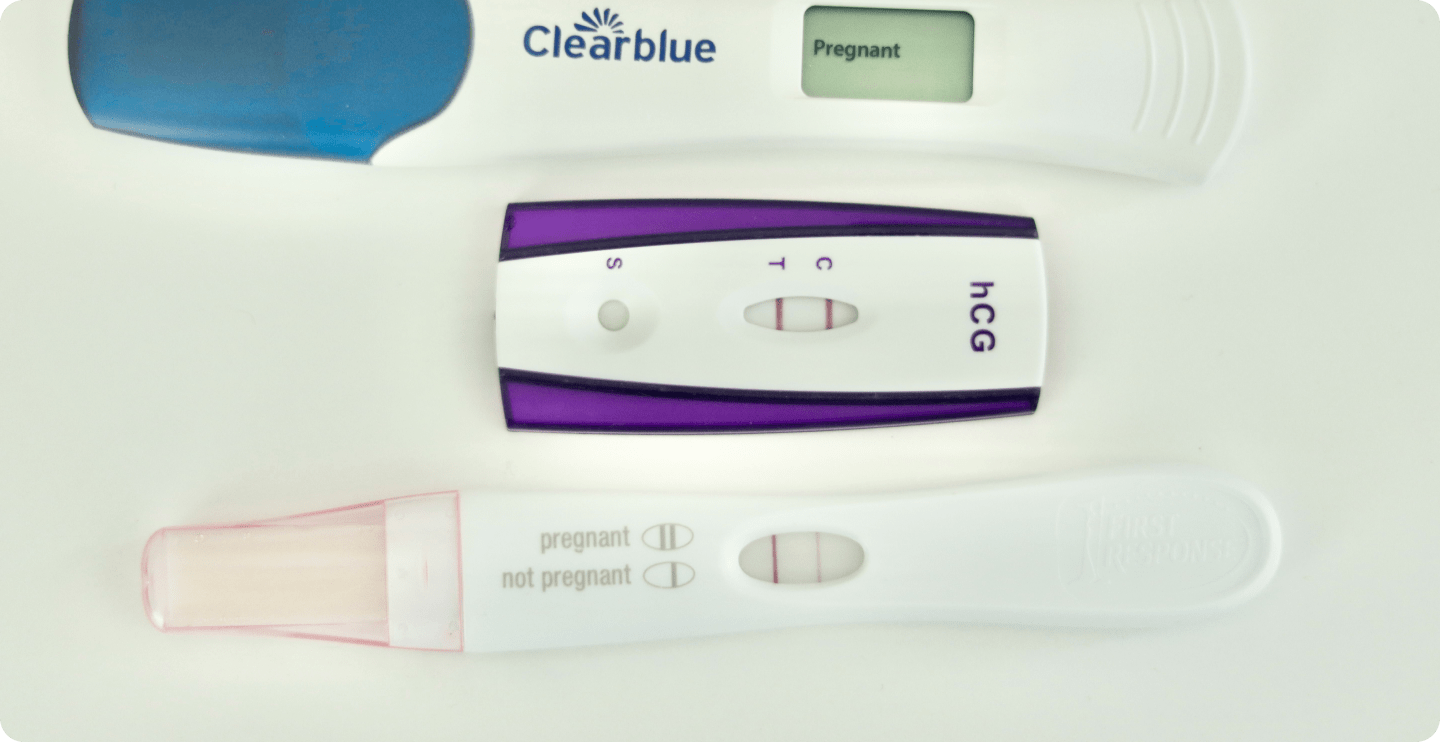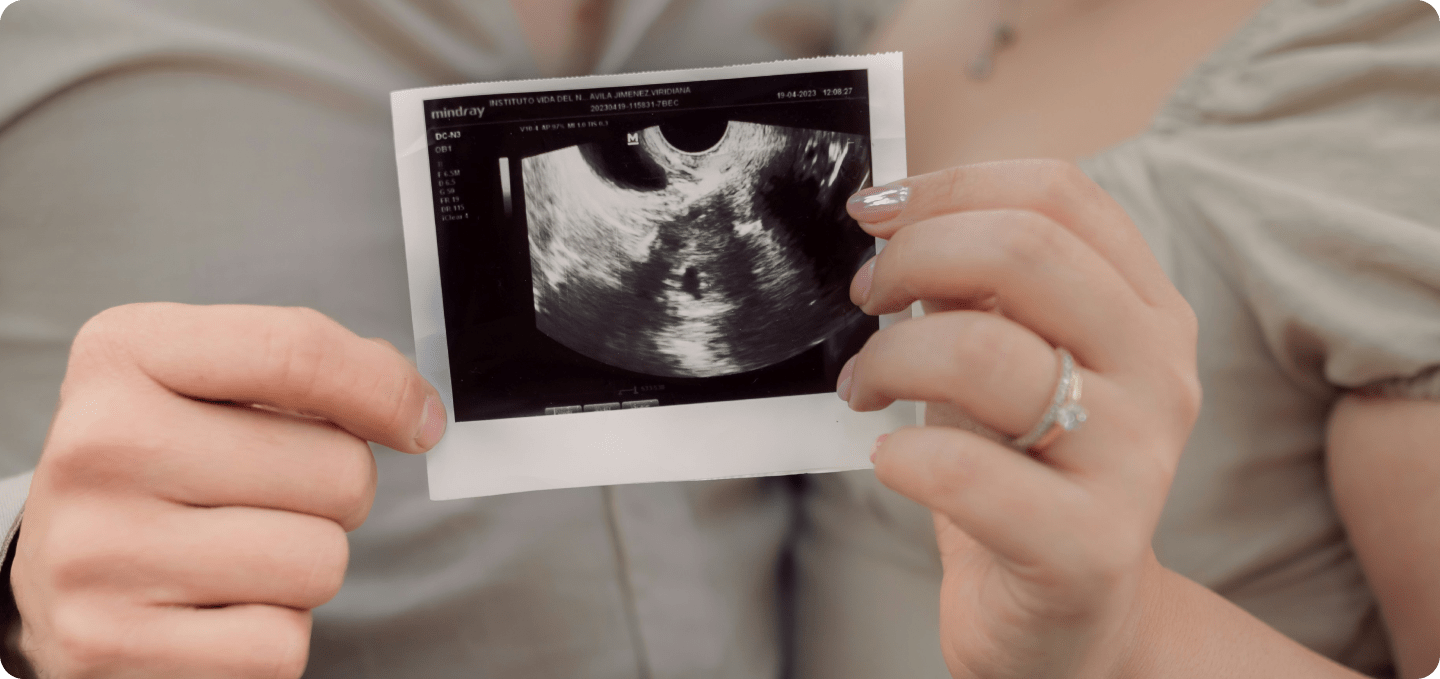When is the best time to take a pregnancy test? Learn everything about early tests, hCG levels, and the safest way to use them.
Key Facts: The Best Time to Take a Pregnancy Test
- Pregnancy tests detect the pregnancy hormone beta-hCG in urine or blood.
- Urine tests are available as early detection tests in pharmacies and can be used from the first day of a missed period.
- Morning urine provides the highest accuracy for urine tests.
- A negative test result before your period is due should be confirmed with another test a few days later.
- Blood tests performed by a doctor offer the highest accuracy and can detect pregnancy even before a missed period.
Don't Take a Pregnancy Test Too Early
Do you suspect you might be pregnant? Your mind is probably racing with thoughts – excitement, nervousness, maybe even a little anxiety. Of course, you want to find out as soon as possible whether your suspicion is correct. But when is the right time to take a pregnancy test, and how reliable are they?
When Can You Take a Pregnancy Test?
A standard pregnancy test can be taken from the first day of your missed period. At this point, it is generally reliable, as the hCG concentration in urine is usually high enough to give a clear result.
In this video, fertility expert Dr. Lora Shahine explains when you can reliably test for pregnancy:
How Soon Can You Test for Pregnancy?
The earliest you can take a pregnancy test is five days before your expected period, but only if you use a test specifically labelled as an "early detection" test. These tests are highly sensitive and can detect even small amounts of hCG in urine.
When to Test After IVF or ICSI
If you have undergone fertility treatment such as IVF or ICSI, the timing of the test depends on when the embryo was transferred and its stage of development:
- Blastocyst transfer (day 5 embryos): A pregnancy test can be taken around 10 days after transfer.
- Transfer of earlier-stage embryos (day 2 or 3 embryos): Testing should be done 12-14 days after transfer.
How Pregnancy Tests Work
Most pregnancy tests detect the hormone hCG (human chorionic gonadotropin) in urine or blood. hCG is often called the "pregnancy hormone" because it plays a crucial role in maintaining pregnancy.

hCG Levels During Pregnancy
In early pregnancy, hCG levels double approximately every 30 to 84 hours. The concentration rises rapidly in the first seven weeks and peaks around week 10 of pregnancy.
hCG not only supports pregnancy but also prevents the body from shedding the uterine lining, which would trigger menstruation.
When Does hCG Production Begin?
hCG production begins after fertilisation and implantation of the fertilised egg into the uterine lining (endometrium). The hormone is produced by trophoblast cells, which later develop into the placenta.
How to Determine the Best Time to Take a Test
Tracking your menstrual cycle and can help you estimate the likely time of fertilisation and implantation. Around 14 days after ovulation – when your period would typically be due – is the best time to take a test. Try out the Cada ovulation calculator.
Home Pregnancy Tests: How They Work
How Does a Urine Test Work?
Urine tests are the most common method for detecting pregnancy. They are easy to use and available in pharmacies, supermarkets, and online.
These tests detect hCG, which is produced after implantation. Special antibodies on the test strip react to hCG and indicate whether pregnancy has occurred.
Your gynaecologist may also perform a urine test at the clinic. You provide a urine sample, which is tested for hCG, and you receive the result shortly after. If positive, the next step is usually an ultrasound scan.

When Should You Take a Urine Test?
- From the first day of a missed period (about 14 days after fertilisation).
- In the morning: Morning urine is most concentrated and provides the most accurate results.
How to Use a Pregnancy Test
Hold the test strip in your urine stream for the recommended time, or collect urine in a container and dip the strip in.
Wait the instructed time before reading the result. Typically, one line means "not pregnant," while two lines mean "pregnant." Digital tests display results as "pregnant" or "not pregnant."
How Reliable Are Home Pregnancy Tests?
When used correctly and after a missed period, home pregnancy tests are about 99% accurate. However, user error can affect the results.
A study review found that at-home pregnancy tests were less sensitive when used outside of lab conditions.
False Positives & False Negatives: Causes of Inaccurate Results
False negatives:
- Testing too early: The most common cause. hCG levels may not be high enough for detection.
- Diluted urine: Drinking too much fluid can lower hCG concentration in urine.
- Incorrect use: Not following the instructions properly can lead to inaccurate results.
False positives:
- Chemical pregnancy: A very early miscarriage where hCG is present but the pregnancy does not continue.
- Medication: Some fertility drugs increase hCG levels.
- Medical conditions: Rarely, some conditions (e.g., kidney disease or certain cancers) can elevate hCG levels.

Blood Tests: Pregnancy Tests at the Clinic
Unlike home urine tests, blood tests must be carried out by a medical professional. A small blood sample is taken and analysed in a laboratory to detect hCG.
When Is a Blood Test Useful?
Although blood tests are more sensitive than urine tests and can detect hCG earlier, it is generally recommended to wait until the first day of a missed period for reliable results.
Exceptions include:
- Fertility treatments: After IVF or ICSI, a blood test is performed two weeks after embryo transfer.
- Irregular cycles or early miscarriage concerns: If you have an irregular cycle or suspect an early miscarriage, consult your doctor about whether a blood test is appropriate.
Advantages of a Blood Test
- More accurate than urine tests and can confirm pregnancy earlier.
- Measures the exact hCG level, allowing doctors to monitor pregnancy progression and detect potential complications.
Types of Blood Tests
- Qualitative blood test: Simply confirms whether hCG is present.
- Quantitative blood test: Measures the exact hCG level, helping track pregnancy development and detect issues such as ectopic pregnancy.
Next Steps After a Positive Pregnancy Test
A positive pregnancy test is a strong indicator of pregnancy, but you should confirm it with a doctor. Regular check-ups will help monitor your baby's development.
Adopting healthy habits, such as a balanced diet, regular exercise, and avoiding alcohol and smoking, is important for a healthy pregnancy.
FAQ
Does a faint line on a pregnancy test mean I'm pregnant?
A faint line on a pregnancy test can indeed indicate pregnancy. It suggests that the hormone hCG is present in your urine, but possibly still at a low concentration. This might be because you took the test very early in your pregnancy when hCG levels are still low. The hCG level approximately doubles every two days in early pregnancy. If you test again in a few days, the line should be stronger if you are pregnant.
What does 'Pregnant 1-2' or 'Pregnant 2-3' mean on a digital test?
When 'Pregnant 1-2' is displayed on a digital test, it means that conception occurred around 1-2 weeks ago. 'Pregnant 2-3' means that conception occurred around 2-3 weeks ago. These timeframes refer to the period since conception, not the week of pregnancy according to a doctor’s calculation. Doctors calculate the duration of pregnancy from the first day of the last menstruation. Thus, '1-2 weeks after conception' roughly corresponds to '3-4 weeks of pregnancy'.
That's what it means:
- 1-2 weeks after conception: 3-4 weeks of pregnancy
- 2-3 weeks after conception: 4-5 weeks of pregnancy
- 3+ weeks after conception: 5+ weeks of pregnancy
I have signs of pregnancy. Could I be pregnant?
If you notice typical signs of pregnancy such as missed periods, nausea, sensitive breasts, tiredness, cravings, or mood swings, you may be pregnant. However, these signs can also have other causes. To be certain, take a pregnancy test, preferably with morning urine. If the result is positive or the symptoms persist, visit your gynaecologist to confirm the pregnancy and seek advice.
What is an evaporation line?
An evaporation line is a faint, usually colourless or greyish line that sometimes appears on a pregnancy test after the urine has dried. It can be mistakenly interpreted as a positive test line, but it is actually caused by the evaporation of urine and not by the pregnancy hormone hCG.
Takeway: Carry out a second test if you are unsure
The best time to take a pregnancy test is from the first day after your period is due. This is especially true for urine tests, which are highly reliable from this point onwards. Early pregnancy tests can be used a few days earlier but are more prone to errors. For the most accurate result, take the test with morning urine, as the hCG concentration is highest at this time.
For absolute certainty and early results, a blood test at the doctor's is recommended. This can be done before you miss your period and provides more precise information about the hCG concentration. If there is uncertainty or a negative test result despite suspicion, a second test should be repeated a few days later. This way, you can proceed with clarity and confidence.
At our fertility clinic in Zurich, we support you in your desire to have children and carry out detailed diagnostics to clarify your situation.







